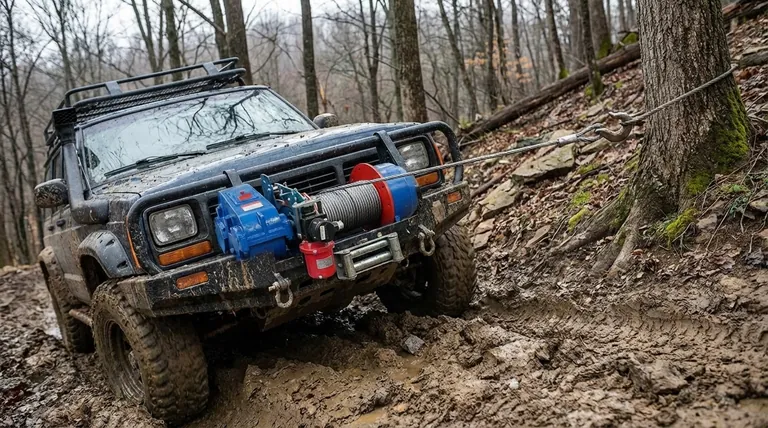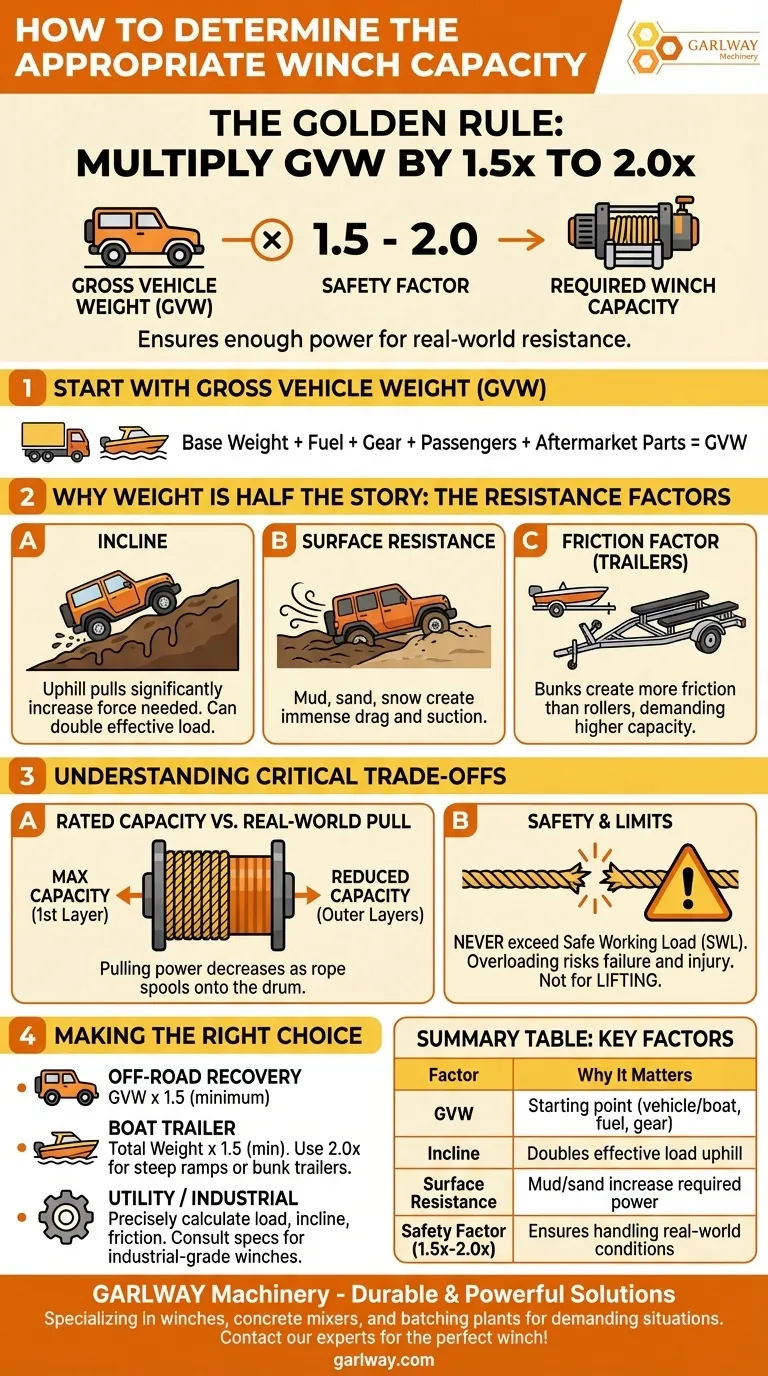To determine the appropriate winch capacity, you must multiply the Gross Vehicle Weight (GVW) of your vehicle or the total weight of your boat by a factor of 1.5 to 2.0. This standard formula accounts for the additional forces of resistance you will encounter in real-world situations, such as inclines and surface friction, ensuring the winch has enough power to perform safely and effectively.
The number printed on the winch is a best-case scenario. The true capacity you need is dictated not just by the weight of your vehicle, but by the incline, friction, and resistance it must overcome.

The Foundational Formula: Gross Vehicle Weight (GVW)
Start with Your Vehicle's Weight
The starting point for any winch capacity calculation is the weight of the object you intend to pull. For an off-road vehicle, this is its curb weight; for a boat, it is its dry weight.
Don't Forget the Extras
You must account for everything that adds to the total weight. This includes fuel, passengers, gear, aftermarket parts like bumpers or roof racks, and, for a boat, the motor and anything stored inside. This fully-loaded figure is the Gross Vehicle Weight (GVW).
Why Weight is Only Half the Story
The Impact of Incline
Pulling a load up an incline requires significantly more force than pulling it on level ground. A steep boat ramp or a muddy hill can easily double the effective weight your winch needs to handle.
The Role of Surface Resistance
The surface your vehicle is on creates drag. Pulling a vehicle stuck in deep mud, sand, or snow requires overcoming immense suction and friction, which adds substantially to the load on the winch.
The Friction Factor (Rollers vs. Bunks)
For trailering, the type of support matters. A boat being pulled onto a trailer with carpeted bunks creates far more friction than one rolling up on rollers, demanding a higher capacity winch for the same boat.
The 1.5x Rule: A Guideline, Not a Law
The Standard for Off-Road Recovery
The general consensus in off-roading is to choose a winch rated for 1.5 to 2.0 times your vehicle's GVW. This multiplier isn't arbitrary; it's a safety factor designed to account for the unpredictable resistance from mud, inclines, and the pull of a stuck vehicle.
Applying the Logic to Trailers
The same principle applies to boat trailers. Calculate your boat's total weight (boat, motor, fuel, gear) and select a winch with a capacity of at least 1.5 times that figure, especially if you use steep ramps or have a bunk-style trailer.
Understanding Critical Trade-offs
Rated Capacity vs. Real-World Pull
A winch's advertised capacity is its maximum pull with only the first layer of rope wrapped around the drum. As you spool more rope onto the drum, the pulling power decreases with each subsequent layer. Your winch may only have about half its rated power when the rope is nearly all spooled in.
The Danger of Exceeding Capacity
Never exceed the winch's Safe Working Load (SWL). Overloading a winch can cause catastrophic failure of the rope or mechanical components, leading to serious equipment damage and severe personal injury. It is always better to have more capacity than you need.
Pulling vs. Lifting
Standard vehicle and trailer winches are designed for pulling loads horizontally. They are not hoists. Using a standard winch for vertical lifting is extremely dangerous as their braking systems are not designed to safely suspend a load in the air.
Making the Right Choice for Your Goal
To select the correct winch, match the capacity to your specific application and always prioritize safety.
- If your primary focus is Off-Road Vehicle Recovery: Calculate your vehicle's fully-loaded GVW and multiply it by at least 1.5, choosing a winch that meets or exceeds that number.
- If your primary focus is a Boat Trailer: Calculate the total weight of your boat with the motor, fuel, and all gear, then multiply by 1.5 to find your minimum required capacity. Increase to 2.0x for steep ramps or bunk trailers.
- If your primary focus is Utility or Industrial Use: Your needs are more specific. Precisely calculate the load, incline, and friction to determine the required force, and consult manufacturer specifications to find an appropriate industrial-grade winch.
Choosing a winch with adequate capacity is the most critical step in ensuring safe and successful operation.
Summary Table:
| Factor | Why It Matters for Winch Capacity |
|---|---|
| Gross Vehicle Weight (GVW) | Starting point: includes vehicle/boat, fuel, gear, and passengers. |
| Incline (e.g., steep ramps) | Pulling uphill can double the effective load on the winch. |
| Surface Resistance (mud, sand) | High friction and suction significantly increase the required pulling power. |
| Safety Factor (1.5x to 2.0x) | Multiplier ensures the winch can handle real-world conditions without being overloaded. |
Need a winch that matches your specific load and conditions?
GARLWAY specializes in manufacturing durable and powerful construction machinery, including a wide range of winches, concrete mixers, and batching plants. Our winches are engineered for reliability in demanding situations, providing the safe performance that construction companies and contractors worldwide depend on.
Let our experts help you select the perfect winch for your project. Contact GARLWAY today for a personalized consultation!
Visual Guide

Related Products
- Electric and Hydraulic Winch for Heavy Duty Applications
- Warn Winch Windlass Boat Trailer Winch
- Electric 120V Boat Winch by Badlands
- Best 18000 Pound Drum Anchor Trailer Winch
- 12000 lb Heavy Duty Electric Boat Winch
People Also Ask
- How do I choose an electric winch? A guide to safe and effective pulling power.
- How does the electric winch work? Unlock the Power of Force Multiplication
- Do electric winches have brakes? Essential Safety for Your Heavy-Duty Pulling
- How to power an electric winch on a trailer? Choose the Best Method for Your Setup
- Can you use an electric winch manually? A Guide to Dual-Functionality Winches



















